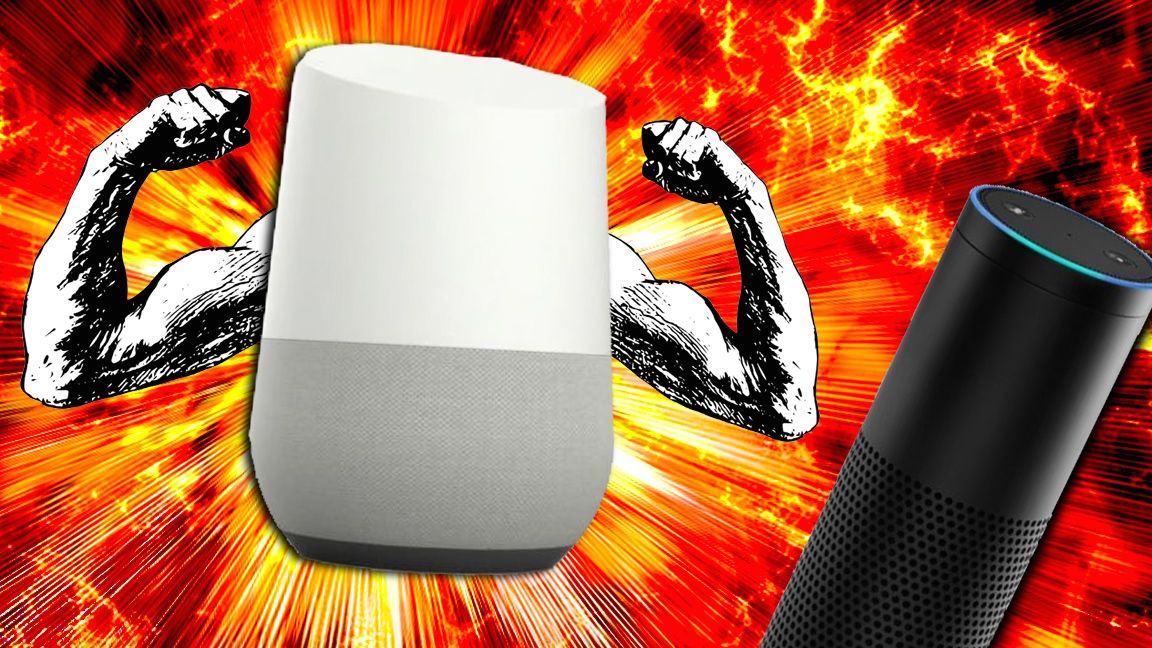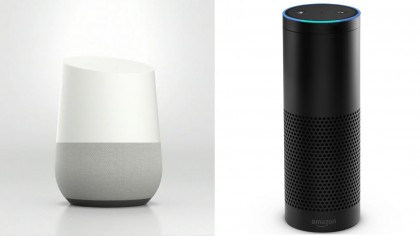5 reasons why Google Home will beat Amazon Echo
Can Google Home silence Amazon Echo? We think so

Google Home is among the most interesting of the search king's current hardware offerings, not least because it sets the stage for an epic showdown between two tech giants.
What is Google Home? Put simply it's a smart speaker, but one that's aimed at pulling together the big G's smart home and audio visual offerings, both past and present. Not only that, it also draws from Google's formidable experience in search to offer information when you want it, where you want it.
Google, however, isn't alone in offering a smart speaker: the Amazon Echo has taken off as a way to interact with the smart home and beyond. Echo has sold surprisingly well, and even spurred a whole line of Echo-compatible products.
As good as Echo is, we think the new kid on the block stands a good chance of silencing its reign. Here are five reasons we think Google Home is the product to dethrone the mighty Echo.
1. Home connects to your Google-built life
Amazon's ecosystem is growing, but it's nothing like Google's just yet. Google has come a long way since it started as a humble search engine, and it now offers a multitude of products and services primed to work with Home. Many of those, unsurprisingly, live on the internet.
This connectivity makes it easy for Home to access services you use regularly, such Calendar, Contacts, and Play Music. If you're an avid Android user, you're already plugged into the Google ecosystem, and Home is just another way to tap into some of Google's most-used services. It is, some would argue, even easier because you can use your voice to do so.
Amazon Echo does work with Google Calendar, but its functionality is limited, and Google is likely to ensure that all of its products play nice together, just like they do, to an extent, with Google Now on Android.
Get daily insight, inspiration and deals in your inbox
Sign up for breaking news, reviews, opinion, top tech deals, and more.
2. Home is smart. Really smart.
Amazon ain't no search giant, that's for sure. Google was built as a hub of information - nearly all freely available information in the world is accessible with a quick search thanks to the G team.
Google's had a voice assistant for some time, activated with the simple "OK, Google" command. Google Now is often hailed as an excellent voice assistant, however it's taken a back seat to the more widely publicized Siri.
Thanks to search and voice, Google Home has an advantage when it comes to smarts. Sure, Amazon Echo has the technology behind it, but it doesn't have the data. Google possess almost two decades worth of information-gathering prowess to back its assistant up, which is sure to show with Google Home.
Google's new voice-controlled assistant, aptly called Google Assistant, will draw from the company's past experience in recognizing the human voice. Not only does it understand language, but it also picks up context. By tapping into its contextual understanding, Google Assistant can figure out what you mean in a grammatically ambiguous request. This will save you time and breath in having to repeat the same words over and over again, plus get you information more readily.
3. Customize your Google Home
This might not be a big deal for some, but for others bringing a new device into their home that doesn't match the decor is a deal breaker. Customization isn't going to be the feature to win me over, but as we expect more personal options with our tech (take the Moto X and new Live Cases for Nexus phones, for example), it will increasingly become the norm. Google Home is no exception.
Just what can you customize on your Google Home? Well, it's not much, but it's something. With Home, you can change out the base of the device to different colors and designs. Or, you could give it the Apple treatment and keep the sleek white look that it comes with.
Amazon Echo comes in one shade, and while its design is no doubt sleek, it doesn't have the same personalization options that Google Home offers buyers.

4. Google Home isn't 'Google Room'
The Amazon Echo may be a great device, but you'd better put it in the room you spend the most time in as you can't, for example, sync multiple Echo devices to play the same song throughout the house.
Google Home, however, draws from Google's already stellar smart media offerings and lets you connect the device to Google Chromecast-based speakers, so you can listen to audio throughout your abode.
Google Home doesn't quite have a better native speaker than Amazon Echo, but one thing is for sure: by connecting with Chromecast audio, you can open your Home to a range of hi-fi speakers.
Perhaps more importantly than music though is the fact that Home connects to your wider smart home, namely Nest and Works with Nest devices. Not only can you control your smart thermostat with the little speaker, but you can also connect to your lighting, locks, and other smart home amenities. Google is constantly adding new Works with Nest products, so the list is growing all the time.
Amazon did team up with Samsung to offer SmartThings control to Echo and the Philips's Hue lighting system, but it's still in the early stages of broadening its friend list. Even though it's been on the scene for longer, Echo has a long way to go before it can catch up with all the devices Google already has at its fingertips.

5. Google Home is ready to play with others
As I've mentioned, Google Home will work well with Works with Nest products, but it looks as though Google is poised have as many other companies sync up with its voice platform as it can.
Even at its original launch event, Google was keen to talk up the amount of companies it was going to work with, with a splash screen that included TicketMaster, WhatsApp, Pandora, GrubHub, Instacart, OpenTablet, Uber and Spotify.
Amazon Echo, meanwhile, is growing its list of compatible apps, including Domino's Pizza, Uber and 1-800 Flowers, but the sheer might of Google may have already tipped the scale in Home's favor.
It will likely be a race to see who can sign up the most third-party apps with the most worthwhile functionality going forward, but both are keen to have their speakers performing as many tasks as possible.
Conclusion
While we'll just have to wait to see which smart speaker comes out on top in the long run. Amazon undoubtedly has a head-start, but Google Home has the might of the world's biggest search giant behind it.
The Echo laid the groundwork for home assistants, but Google is ready to swoop in and do what it does best: serve up information and manage your digital life. Home is also slightly more affordable, too, which is another notch in its belt against Echo.
Just don't expect to be able to order products from Amazon on Home. That's one strike Google's smart speaker has against it.
- More coverage: Google Home vs Amazon Echo
Christian is a writer who's covered technology for many years, for sites including Tom's Guide, Android Central, iMore, CNN, Business Insider and BGR, as well as TechRadar.